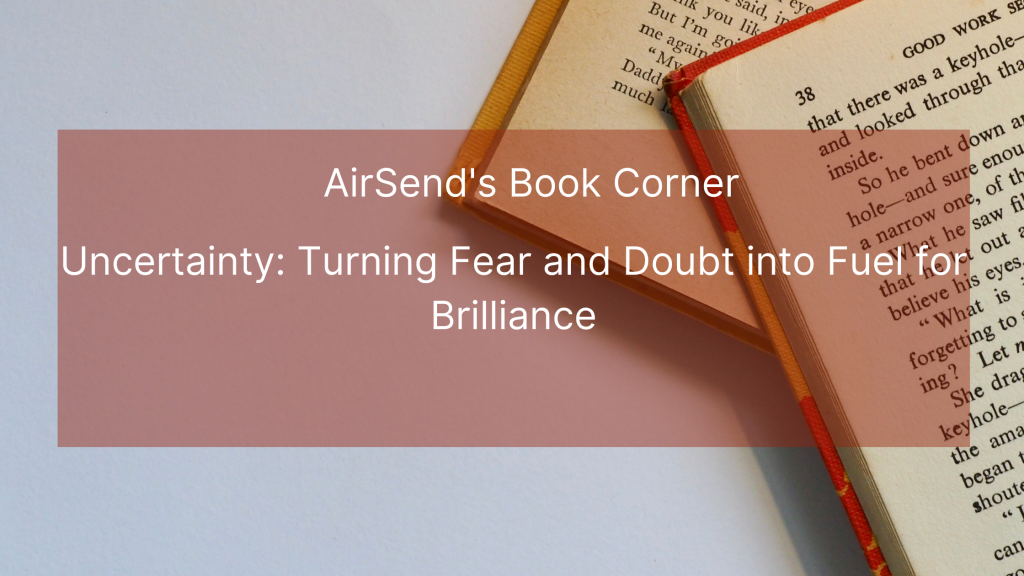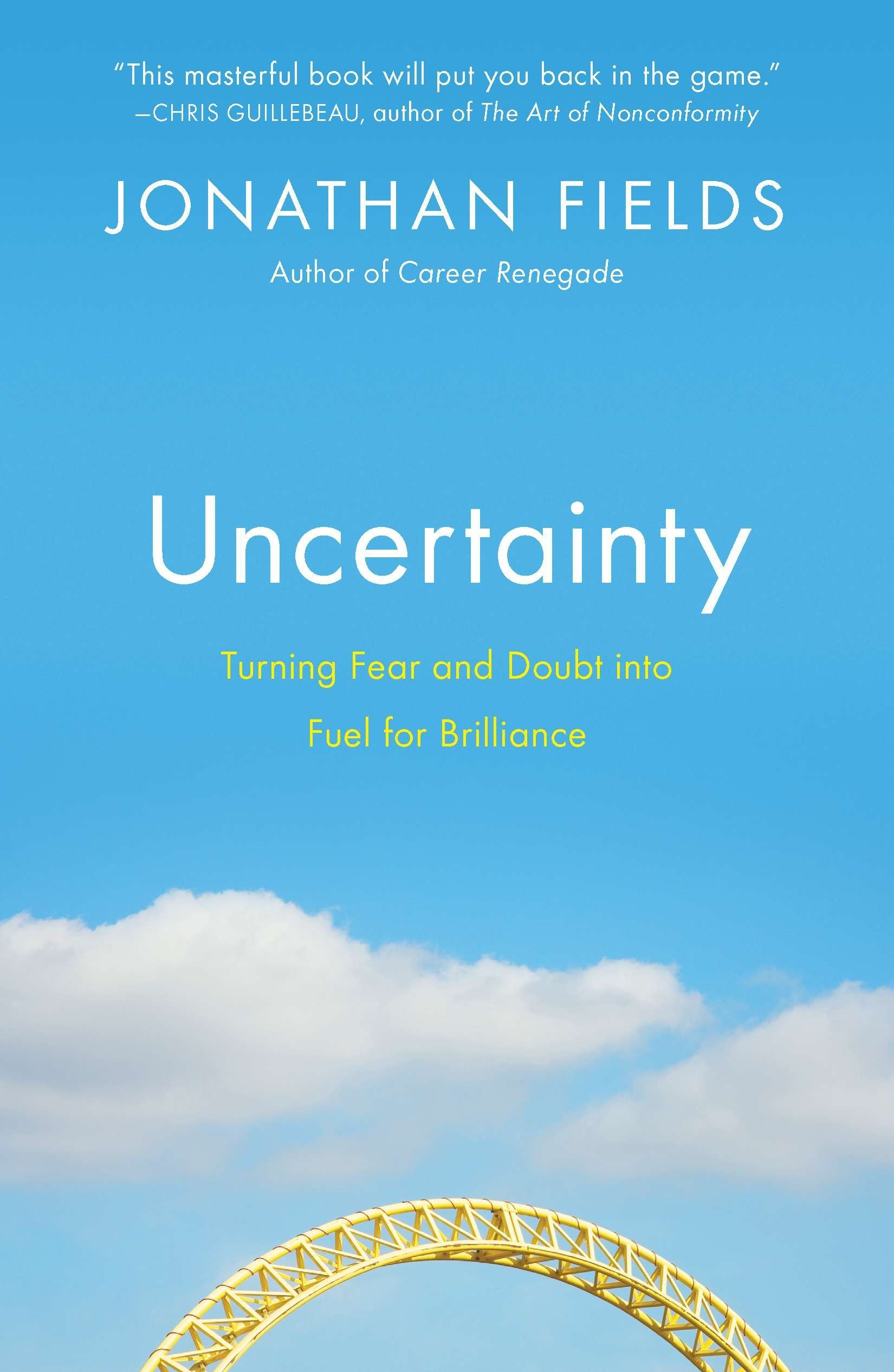“It is not just a book, it is the guidebook to facing the unknown fear.”

Please note that this blog will be discussing two chapters that we believed carried the most significance to our topic. The whole book is a wonderful read, and as much as we would love to discuss the whole book, the magic should be left for the reader to experience.
The purpose of Fields’s research is to convince readers that having fear of the unknown is necessary for business. Additionally, Fields provides wonderful examples and strategies of how to combat uncertainty when starting a business. Uncertainty is fear. Fear can be anything when starting a business, such as the unspoken judgment when a project launches, the unpredicted feedback, or simply the fear of an idea being successful or not.
The two chapters we will be focusing on are, “Chapter 1: Why Uncertainty Matters,” and “Chapter 4: Find your Certainty Anchors.” Found in the introduction, Fields discusses filmmakers and CEO’s who turned their life around with fear and an idea. Additionally, he also provides a general layout of what the book will cover and their significance. Every professional is afraid to start their own business, expand on an idea, etc. But, according to the author, we shouldn’t be afraid of uncertainty. The Uncertainty Matters, and here’s why.
Chapter One: Why Uncertainty Matters
Probably one of the most significant and meaningful inspiration can be found in the first chapter, “When you begin, nothing is certain save the drive to create something worth the effort. The more certain you are of the answer or the outcome in advance, the more likely it is to have been done already- to be derivative- and the less anyone will care, including you. Anything certain has already been done,” (Fields, p. 15).
Consider this quote to be a Business 101 Guide to learning how to start your practice. To find certainty in an idea means to create something innovating. In other words, the idea should only speak uncertainty. The question then remains, how do we use the uncertainty to our advantage?
“Creators need data. They need judgment, feedback, and criticism. Without them, there’s no way to know whether what you’re creating is working or not. When you base your actions on random guesses, rather than on relevant information, growth and movement towards brilliance slow dramatically or grind to a halt. Kill constructive judgment and you retard growth, adaptation, and evolution,” (Fields p. 18). Judgment, feedback, and criticism are all uncertain elements that we dread to hear when testing out an idea. Why? Because we do not want to be told our idea is a failure. As leading innovators, our ideas represent who we are, and what we stand for.
Additionally, Fields has taken the opportunity of including subsection that eases the reader into the topic of uncertainty. For example, there is a subsection titled, Amplifying Uncertainty, Exalting Uncertainty, It’s Not Just for Start-Ups and Tech, and Hailed But Reviled. Through each subsection, the author provides amazing examples of other like-minded creators. These creators, much like us in the beginning, had an uncertain idea and ran with it. As reiterated before, when facing uncertainty, it is almost always best not to face the unknown empty-handed. Chapter four is the first step in creating your arsenal.
Chapter Four: Find Your Certainty Anchors
The purpose of this chapter is to prepare your arsenal for uncertainty. First, we must ask the question, “What is a certainty anchor?” Under the subsection, The Power of Certainty Anchors, the author explains the definition. “A certainty anchor is a practice or process that adds something known and reliable to your life when you may otherwise feel you’re spinning off in a million different directions,” (p. 46). In other words, the concept of certainty anchors is routines or ideas that remain with you at all times.
Certainty anchors could be ideas, rituals, routines, or positive thinking. We find it best to think of Certainty Anchors as routines that help expose my creative process. The reason being is that routines are always there. They are grounding experiences to which you can always return to. In other words, no matter how successful or unsuccessful business is, you can always return to my routines.
Steven Pressfield, author of “The War of Art,” opens a window into the power of ritual in creative work. “Broader lifestyle routines serve as a salve to calm a bit of the anxiety of creation and to drop an anchor to which we can tether our creative lines, knowing we can then float higher up in the clouds and stay there longer, trusting that we will be able to find our way down,” (p. 47).
Routines, i.e. certainty anchors, help overcome the fear, anxiety, and discomfort of uncertainty. Routines are one of the symbols of familiarity (the other is knowledge). Familiarity helps take on challenges that make you feel productive. You wouldn’t try something new unless you were positive you had the knowledge to do so. Why? Well, again, it is because we know that our familiarity (routines and/or knowledge) cannot be taken away from us.
Conclusion
The first step in dealing with uncertainty is to first acknowledge its presence. The second step is Certainty anchors. Accept the fear (i.e. uncertainty). You can always acknowledge that something exists, but to accept it as a part of creation is different. After acknowledging and accepting the uncertainty, Fields uses the remainder of the book to discuss how to apply uncertainty to your practice.
Throughout the book, there are many examples, advice, and knowledge of how to start a business. Fields’s research revolves around facing uncertainty in the business/professional world. His goal is to provide insight and inspire like-minded entrepreneurs to face fear rather than run away from it.
Fields once said, “Snuffing out uncertainty leads to a sea of prematurely terminated mediocre output…if only we’d had the will to embrace uncertainty, risk, and judgment, and hang on a bit longer. If only we’d learn how to harness and ride rather than hunt and kill the butterflies that live in the gut of every person who strives to create something extraordinary from nothing,” (p.27).

AirSend is a versatile digital workspace to share files, send messages, and complete tasks. See how AirSend can help you.
One Reply to ““Uncertainty,” The Must-Have Book for Starting your Practice”